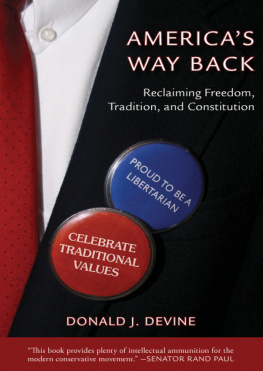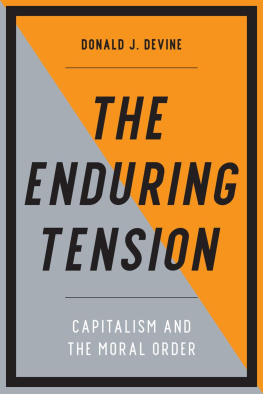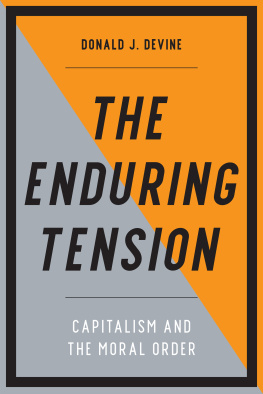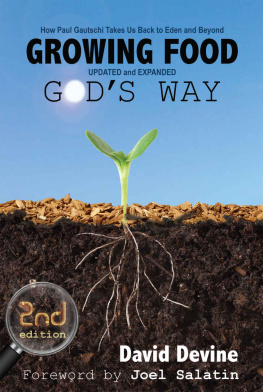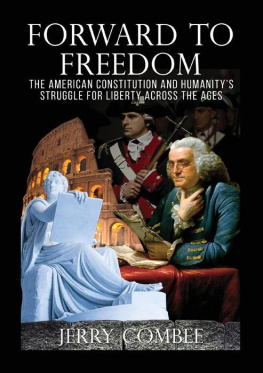Introduction
THE CHALLENGE
THE PAST SEVERAL YEARS HAVE been dispiriting for Americans. Economic stagnation, moral exhaustion, and looming bankruptcy have become hallmarks of our time.
Nothing has seemed to work. In 2008, Americans dramatically rejected the actions of Republican George W. Bush's administration by embracing a new, progressive president. Democrat Barack Obama promised a new energy to fulfill the progressive ideal of a responsible welfare state; he would commit the full power and public resources of the national government necessary to resolve America's major problems. But even as the administration produced more transformational legislation than any in memory, the economy sputtered, unemployment remained stubbornly high, the federal debt skyrocketed, and the entitlement bomb came closer to going off. Obama managed reelection in 2012, but as one of his prominent supporters put it, The thrill of 2008 had turned into the frustration of 2012. It now was clear that our democracy seems incapable of fixing the serious problems the nation confronts.
There is a good reason for our failures to solve our economic and cultural problems: few leadersof either political partyunderstand the source of the problems. As a result, their so-called solutions simply have not worked, and yet leaders call for more of the same old techniquesmore money poured into more government programs, and tighter controls over the American creative spirit. This persistence in the face of obvious failure reflects a triumph of progressive hope over the real-world experiences of the past century. Welfare-state progressivism has so corrupted modern political thinking that it has obscured the secret of America's success: the U.S. Constitution's capacity to harmonize the twin ideals of freedom and tradition.
There is an inherent tension between freedom and tradition. Indeed, supporters of one over the other often suggest that a synthesis of the two cannot work. It must be one or the other. Traditionalists claim that pure freedom leads to disorder, decline in public morality, and ultimately anarchy. Libertarians, meanwhile, claim that pure tradition is restrictive, authoritarian, and ultimately tyrannical.
But this book argues that each single ideology needs to be synthesized with the other to escape its own limitations. A close study of the Americanand broader Westernexperience reveals that managing the tension between freedom and tradition has been the very source of our historic creativity and prosperity. Far from being incompatible, freedom and tradition need each other: freedom needs tradition for law, order, inspiration, and energy; tradition needs freedom to escape stagnation, coercion, and decline. The great achievement of the Constitution's framers was in providing a means for synthesizing freedom and tradition. They carefully crafted a flexible system in which powers were separated and a multiplicity of institutions checked and complemented one another.
Unfortunately, few Americans now understand their Constitution as the Founders did. Most schoolchildren learn about the formal separation of powers among the three branches of the federal government. Often overlooked are the Constitution's more extensive checks and balancesespecially the way the document explicitly reserves most rights to the people and to the states. In Federalist 51, James Madison noted that the Constitution provided double security for the people's rights by dividing power between two distinct governments. The division of powers allowed different traditions and communities, and the individuals representing them, to act freely and creatively. This is the essential aspect of limited constitutional government: it allows most decisions to be made regionally, locally, and privatelynot to be forced by Washington.
Today, however, the central government is the major decision maker on most important matters. This change did not happen by accident. Influenced by late-nineteenth-century European thinkers, America's progressive movement proclaimed the superiority of concentrated power over the Constitution's separated powers. Progressives called for a new science of administration, believing that national experts could solve society's problems better than the old Constitution ever could. As we will see, this fatally flawed belief has led to most of the fundamental problems we are experiencing today.
To successfully confront these problems, America needs a restoration of the constitutional synthesis of freedom and tradition that has regenerated the West, and the United States in particular, so often before. Such a revival will not be easy, not when the progressive revolutions of the past century have so obscured the foundational role freedom and tradition have played. To rediscover the old Constitution, we must take an extended intellectual journeyinto public administration, political science, law, philosophy, even the nature of science itself.
A Few Great Men
Several of the great figures of our time inspired this book. One remains a universally recognized historical figure; one continues to inspire academic professionals in economics, politics, law, and philosophy, in all of which he excelled; another was a charismatic public figure and writer; and a fourthand most important for this bookis hardly recognized today. These four men were Ronald Reagan, F. A. Hayek, William F. Buckley Jr., and Frank S. Meyer.
Professor Hayek was the first to make a deep impression on the world. His 1944 book The Road to Serfdom was a rare bestseller for an academic work. Hayek came from a distinguished Austrian family of intellectuals and entered the study of economics as a means to combat the devastation his nation faced after the Great War. He became a member of the informal group of academics in Vienna referred to as the Austrian School, which included his teacher Ludwig von Mises, the philosopher of science Karl Popper, and the great economic historian Joseph A. Schumpeter, who all promoted the virtues of freedom and markets as superior alternatives to the then-dominant doctrine of socialism.
Hayek's 1960 book, The Constitution of Liberty, convinced me of the importance not only of his economic insights on freedom but also of his stress on law and the Western tradition as the foundation for the market and for the free society generally. My interest in Hayek inevitably led to Popper, Schumpeter, and Mises, who together helped refine the cosmology, epistemology, and understanding of history, politics, and law that form the basis for this book. Later, I had the opportunity to meet and learn from Professor Hayek through the international professional association of scholars he organized, the Mont Pelerin Society.
In 1955, William F. Buckley Jr. founded National Review magazine. He gathered a group of intellectuals of both libertarian and traditionalist bent who were unified only in opposition to what they considered a threatening communism and a moribund progressive welfare state. Over time, the creative interaction among the editors and the electrifying atmosphere they created for others outside that circle produced a fusion of the ideals of freedom and tradition that would become the unifying theme for the modern conservative movement.
No figure was more important to this fusionism than Frank Meyer, an editor at National Review who worked closely with Buckley. Born into a secular family, Meyer had been attracted to communism at a young age, becoming a major functionary of the Communist Party USA. After becoming disillusioned and reading

